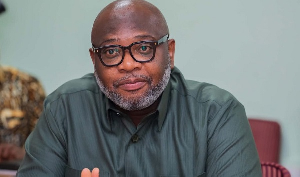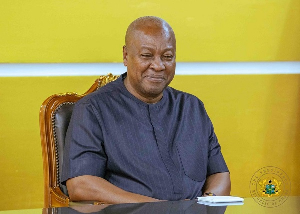Parliament has decided that all the revenue agencies, Customs, Excise and Preventive Service, Value Added Tax Services and Internal Revenue Service must be permitted to retain a ceiling of three per cent of the revenue they collect.
The report on the Revenue Agencies (Retention of part of the Revenue) Bill on Thursday went through the consideration stage and duly read for the third time and passed by Parliament.
The Motion, which was debated by the House, was read on behalf of the Minister of Finance, Mr Yaw Osafo-Maafo by the Senior Minister, Mr J. H. Mensah. The Objective of the Bill is to put into law for the agencies to use the amount for their operational and administrative expenses.
Mr Mensah said that the disbursement of the amount would be in accordance with the current budget processes and Parliament would be involved. He said it was necessary to ensure that the agencies understood that the three per cent was a ceiling and that the percentage retention may vary from year to year with the Revenue Agency Board to supervise the use of the money.
Mr Collins Appiah-Ofori, Deputy Chairman of the Finance Committee, who read the report said the Bill was laid in the House on 11 June and referred to the Committee for consideration and report in accordance with Article 169 of the Standing Orders of the House.
He said it was found out that the current statutes governing these agencies did not allow them to retain any part of the revenue collected for their operational and administrative expenses but required them to pay all monies into the Consolidated Fund.
Mr Appiah-Ofori said it was expected that the retention of some of the revenue collected would ensure the smooth running of these agencies as envisaged in their enabling enactment's to lead to efficiency and optimum collection of taxes. It was further observed that the retention of the three per cent would enable the revenue agencies to undertake and acquire their basic and capital needs.
He said the Committee, however, did not agree to a petition from the Federation of Associations and Unions of the national revenue agencies request for five per cent instead of three per cent since it considered the three per cent ceiling as quite enough and must be left at such.
Mr Dan Abodakpi, NDC-Keta, said the passing of the Bill was a proactive move, which aimed at motivating the revenue agencies to perform their duties effectively to support government to meet its budgetary requirements. Mr Johnson Asiedu Nketiah, NDC-Wenchi West, disagreed with the statement that the three per cent would not be automatic and said it ought to be so to motivate the collection of more taxes.
Mr Abuga Pele, NDC- Chiana-Paga, said he was worried about the granting to the Minister for Finance the discretion of retaining the percentage since such an arrangement would be a disservice to the collectors and suggested that there should be institutional controls.
Papa Owusu-Ankomah, Minister of Parliamentary Affairs and the Majority Leader, said there was the need to recognise that the revenue agencies were under the supervision of the Ministry of Finance and there should be some control measures.
He said if the percentage were made absolute, it would tie the hands of the Minister since he could not monitor the collection of revenue. Papa Owusu-Ankomah said it would not be advisable to make the percentage open since "we have just begun and appealed that the Bill be considered so that come next year some changes can be considered.
Alhaji Seidu Amadu, NDC- Yapei/Kusawgu, said care must be taken about the issue and asked whether when the agencies did not achieve the target they were still to retain the three per cent and suggested that they should rather be honoured when they make excess collection.
The Senior Minister in summing up, said the facility meant that whenever an amount was collected the revenue agencies could put aside the three per cent without referring it to the Accountant General's Department since previously they needed a fiat from the Department before they could make their purchases from the revenue collected.
General News of Friday, 21 June 2002
Source: gna












